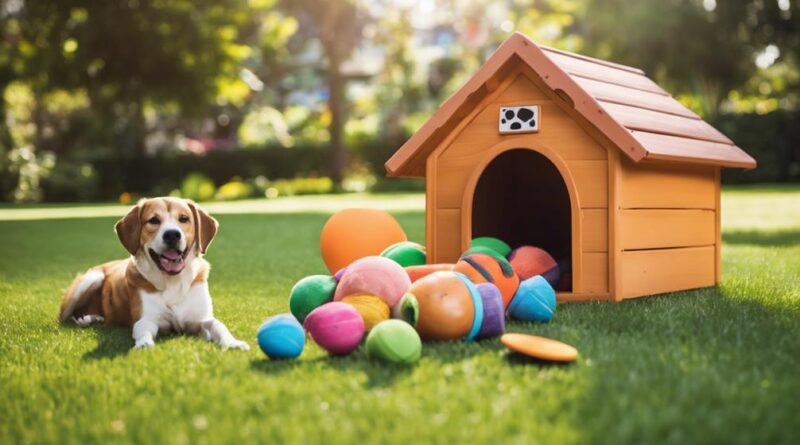Top 15 Expert Tips for Optimal Dog Care
When it comes to caring for your beloved canine companion, the balance between knowledge and practice is crucial.
You might be providing the basics, but have you considered the finer details that can truly elevate your dog's well-being?
From nutrition insights to behavior tips, this comprehensive guide will equip you with the essential tools to enhance your dog's quality of life.
So, if you're ready to take your dog care skills to the next level and ensure your furry friend thrives, these expert tips are a must-know for every conscientious dog owner.
Proper Nutrition
For optimal health, ensure your dog receives a balanced diet rich in essential nutrients. Nutritional balance is crucial for your furry friend's overall well-being. Make sure their meals contain a mix of proteins, carbohydrates, fats, vitamins, and minerals. Consult your veterinarian to determine the best diet for your dog based on factors such as age, breed, weight, and any existing health conditions.
Establishing a consistent feeding schedule is also key. Dogs thrive on routine, so try to feed them at the same times each day. This helps regulate their digestion and can prevent issues like bloating or obesity. Providing fresh water at all times is equally important to keep your dog hydrated and healthy.
Avoid giving in to the temptation of feeding your dog table scraps or excessive treats, as these can lead to nutritional imbalances and weight problems. Remember, a well-fed dog is a happy and healthy dog.
Regular Exercise
Ensure your dog stays healthy and happy by incorporating regular exercise into their daily routine. Fun activities and playtime routines are key to keeping your furry friend active and engaged. Regular exercise is vital for your dog's overall well-being, helping to maintain a healthy weight, improve cardiovascular health, and enhance muscle strength.
Engage your dog in interactive games such as fetch, tug-of-war, or hide-and-seek to stimulate their mind and body. These activities not only provide physical exercise but also strengthen the bond between you and your pet. Additionally, consider taking your dog for daily walks or runs to allow them to explore their surroundings and release pent-up energy.
Remember to tailor the exercise routine to your dog's breed, age, and physical condition. Shorter play sessions throughout the day may be more suitable for smaller breeds, while larger dogs might require more vigorous activities. By incorporating fun activities and playtime routines into your dog's daily schedule, you're promoting a healthier and happier lifestyle for your beloved pet.
Grooming Essentials
Incorporate regular grooming into your dog's routine to maintain their hygiene and overall well-being.
Brushing your dog regularly is essential for their coat maintenance. Depending on your dog's breed, you may need to brush them daily or a few times a week. Use a suitable brush for your dog's coat type to prevent matting and tangles. When brushing, start from the top and work your way down to ensure all areas are covered. If your dog has a long coat, consider using a detangling spray to make the process easier. Pay special attention to areas like behind the ears, under the legs, and around the tail where knots tend to form.
Not only does regular brushing keep your dog's coat looking healthy and shiny, but it also helps distribute natural oils, promoting skin health. By incorporating proper brushing techniques into your dog's grooming routine, you can ensure they stay clean, comfortable, and happy.
Health Monitoring
Regularly monitoring your dog's health is crucial for detecting any potential issues early on. Schedule regular veterinary check-ups to ensure your furry friend receives proper preventative care. These visits help catch any health concerns before they escalate, keeping your dog happy and healthy.
In addition to veterinary check-ups, stay on top of parasite control. Administer preventive medications as recommended by your vet to protect your dog from harmful parasites like fleas, ticks, and heartworms. These parasites can pose serious health risks to your dog if left untreated.
Furthermore, prioritize your dog's dental hygiene. Regularly brush your dog's teeth and provide dental treats or toys to help maintain their oral health. Poor dental hygiene can lead to gum disease and other health issues, so taking care of your dog's teeth is essential.
Training Techniques
To effectively train your dog, consistency and positive reinforcement are key elements that yield successful results. Positive reinforcement involves rewarding your dog for good behavior to encourage them to repeat it. This can be in the form of treats, praise, or playtime. Consistency in training means setting clear rules and boundaries that are consistently enforced by all family members.
When implementing positive reinforcement, it's crucial to reward your dog immediately after they exhibit the desired behavior. This helps them make the connection between their actions and the reward. Through consistent positive reinforcement, you can effectively shape your dog's behavior and encourage them to display desirable actions.
Behavior modification techniques can also be used to address unwanted behaviors in your dog. By identifying the triggers that lead to undesirable actions and modifying the environment or response to these triggers, you can help your dog learn more appropriate behaviors. Remember, training takes time and patience, so be sure to stay consistent and positive throughout the process.
Socialization Skills
When it comes to socialization skills for your dog, exposing them to various environments and settings is essential for their overall well-being and development. Playdate etiquette plays a crucial role in helping your furry friend learn how to interact with other dogs and humans appropriately. Encouraging positive interactions during playdates can help in shaping your dog's social skills positively.
Behavior modification is another key aspect of socialization. If your dog exhibits any undesirable behaviors during social interactions, it's important to address them promptly. Use positive reinforcement techniques to encourage good behavior and discourage any negative actions. Consistency is key in reinforcing positive socialization skills.
Taking the time to socialize your dog properly can lead to a well-adjusted and friendly companion. Remember that each dog is unique, so be patient and understanding throughout the socialization process. By focusing on playdate etiquette and behavior modification, you can help your dog develop strong social skills that will benefit them throughout their life.
Safe Environment

Creating a safe environment for your dog involves ensuring that potential hazards are minimized and that your furry companion has a secure space to thrive in. When it comes to indoor safety, make sure to keep harmful chemicals, small objects, and electrical cords out of reach. Consider using baby gates to block off areas that are off-limits to your pup.
Outdoor hazards can include toxic plants, sharp objects, and open gates. Regularly inspect your yard for any potential dangers and secure fencing to prevent escapes. Provide your dog with a comfortable shelter that protects them from extreme weather conditions. Additionally, always supervise your dog when they're outdoors to prevent accidents.
Quality Time
Spending quality time with your dog is essential for building a strong bond and fostering a happy relationship. Engaging in bonding activities like interactive playtime benefits both you and your furry companion. Playing fetch or tug-of-war not only provides physical exercise but also stimulates mental alertness and reinforces obedience. These activities create a sense of trust and communication between you and your dog, enhancing your connection.
Regular play sessions are vital for your dog's overall well-being. It helps prevent boredom, reduces stress and anxiety, and can even curb behavioral issues. Your dog will feel loved, valued, and secure when you dedicate time to play and interact with them. Additionally, these moments of fun and laughter strengthen the emotional bond between you and your pet.
Frequently Asked Questions
Can Dogs Eat Fruits and Vegetables as Part of Their Diet?
Yes, dogs can eat fruits and vegetables as part of their diet. These make safe treats and can contribute to a balanced diet for your furry friend. Just remember to introduce new foods slowly to watch for any adverse reactions.
Some fruits and veggies are better for dogs than others, so it's essential to research which ones are safe and beneficial for your pup. Always consult with your vet for specific dietary recommendations.
How Often Should I Bathe My Dog to Maintain Their Hygiene?
You should bathe your dog based on their lifestyle and coat type. For general maintenance, aim for a bath every 4-6 weeks. Regular bathing can help with flea prevention and keep your furry friend clean. Follow a grooming schedule that includes brushing and nail trims in between baths to maintain overall hygiene.
Remember to use dog-specific shampoo and rinse thoroughly to avoid skin irritation.
Are There Any Specific Signs or Symptoms I Should Watch for to Monitor My Dog's Health?
To monitor your dog's health, look out for common illnesses like vomiting, diarrhea, lethargy, and loss of appetite. Behavioral changes such as increased aggression, anxiety, or excessive licking can also indicate an issue.
Regularly checking for signs of discomfort, changes in eating habits, or unusual behaviors can help you catch any health concerns early on and seek veterinary care promptly.
Keep a close eye on your furry friend's well-being for their best care.
What Are Some Advanced Training Techniques for Challenging Behaviors in Dogs?
When facing challenging behaviors in dogs, behavior modification through positive reinforcement is key. Utilize advanced training methods like desensitization techniques to address these issues effectively.
By gradually exposing your dog to triggers and rewarding calm behavior, you can reshape their responses. Consistent training and patience are crucial for success.
How Can I Ensure My Dog Is Getting Enough Mental Stimulation and Enrichment in Their Daily Routine?
To ensure your dog is mentally stimulated, engage in activities like training sessions, puzzle games, and scent work. Interactive toys can provide mental exercise, keeping your pup entertained and sharp. Rotate toys to keep things exciting. Consider food-dispensing toys to challenge your dog's problem-solving skills.
Additionally, incorporate short training sessions throughout the day to keep their mind active. These simple steps can make a big difference in your dog's daily routine.
Conclusion
In conclusion, by following these expert tips for optimal dog care, you can ensure your furry friend lives a happy and healthy life. Remember to provide proper nutrition, regular exercise, grooming essentials, health monitoring, training techniques, socialization skills, a safe environment, and quality time.
Your dog deserves the best care possible, and with these tips, you can give them just that. So go ahead and show your pup some love and attention – they'll thank you for it!
